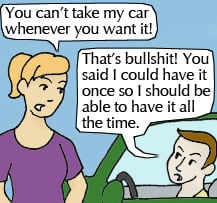Immigration reform has become a hot-button issue in the US.
A growing number of Americans realize that it’s past time we carved out new, more just and fair pathways to citizenship and treated immigrants of all stripes and backgrounds humanely and with respect.
But unfortunately, many of the conversations we’re having about immigrants are often still based on false stereotypes about who they are and what impact they have on our culture.
Even in a country built on the ideal of being a “melting pot,” myths about immigrants remain pervasive.
And they’re a huge obstacle to getting immigration reform passed and helping improve a lot of lives in the process. Instead of speaking truth about immigrants’ lives and experiences, politicians have turned our conversations about immigrants into a fear campaign.
The most notorious face of these myths is Donald Trump, who has spent the last few months on the campaign trail rallying against compassionate immigration reform by painting immigrants as criminals who weaken our economy and don’t contribute positively to our society.
Rather than tackle the problems America has created for itself economically and socially, Trump would rather use immigrants as a scapegoat to explain away violence, economic insecurity, and tumultuous social politics.
But Donald Trump isn’t alone in his beliefs. There’s a sizable part of the US American population who feels he’s simply “telling it how it is.”
In other words, there’s a whole lot of US citizens who think myths are facts.
And although immigrants can come to the US from any country, and often do, the image of today’s immigrant in the mind of most Americans is a Latinx person. For that reason, it goes without saying that the fight for immigration reform is a fight fit for intersectional feminism.
The myths we see perpetuated about “immigrants” and “immigration” are often tied up in racism, classism, and xenophobia.
Politicians, the media, and even everyday people in the US perpetuate harmful stereotypes about immigrants that we, as feminists, need to know better than to believe in.
The idea that immigrants are lazy stems from racist ideas about people of color. The notion that immigrants are dangerous is linked to xenophobic paranoia that paints what is “different” as what is “dangerous,” and that kind of thinking stops diversity and multiculturalism in its steps.
And the fear and animosity folks try to instill in us about immigrants pits us against one another, when social justice principles remind us that what we need to do is come together to achieve real equality for everyone.
Dispelling myths about immigrants and immigration is a feminist issue – and, armed with the truth, we can do just that.
Myth #1: Immigrants Waste Taxpayer Money and Drain the Economy
A longstanding myth about immigrants – especially those who are undocumented – is that they’re a drain on our economy.
We’ve all heard these arguments: immigrants come here to waste taxpayer money by relying on social assistance programs; undocumented immigrants get to make money without paying taxes; immigrants are coming to the US to make money to send back to other countries.
But data doesn’t back these arguments up. In fact, the data straight-up refutes them.
Economists of all stripes are generally agreed upon the economic benefits of immigration, and it’s because the research on immigrants speaks for itself.
Study after study has found that immigrants aren’t evading taxes, holding back on spending, or even massively relying on social programs – instead, it shows that they’re paying their share, stimulating our economy, and striving for self-reliance.
Immigrants – naturalized and undocumented alike – often come to the US to work, and by participating in the legal economies in our communities they also pay into them.
It’s easy to imagine that all immigrants are working under-the-table jobs and skipping out on their debt to Uncle Sam – but the truth is that in 2012, undocumented and naturalized immigrants together paid over $11.8B in state and local taxes. (Not to mention that those who do work under-the-table jobs are often being exploited and abused – and we should be fighting for them, not against them.)
And even though immigrants are paying their fair share in payroll taxes, they’re actually losing out when it comes to social support programs.
Undocumented immigrants and folks here on legal work visas have a lot to lose by asking for financial help from the government, which might explain why studies find that immigrants on the whole rely less on Welfare and food stamps than native-born Americans.
These two facts, in tandem, illustrate just how misguided the myth of the wasteful immigrant is. Immigrants aren’t a drain on our resources.
Nope! Far from it. The math just doesn’t add up.
Immigrants are putting more money into our economy than they take out, and actually going further in reforming the immigration system would only lead to more economic growth.
Immigrants couldn’t possibly come here to work without spending a dime of their hard-earned cash, and studies show they spend a whole lot of it locally.
By holding down jobs and bringing in money, immigrants are better able to patronize local businesses – out of need and desire – which then expands the economies they’re a part of and leads to even more labor opportunities for other people.
Economists predict that passing the DREAM Act, which makes it easier for certain undocumented immigrants to become naturalized citizens, would add $32.9B to our economy by 2030.
Legalizing the presence of all currently undocumented immigrants in our country and passing comprehensive immigration reform would add $1.5 trillion to our GDP in ten years.
And temporary reprieve for undocumented immigrants currently residing in the states would bring in $845 million a year, whereas amnesty for those immigrants would add $2.2 billion a year to our economy.
At the most basic level, immigrants stimulate our economy.
And that’s because in economics, more people means more growth, and more immigration means more people.
That means that immigration reform really is intersectional feminism in action: by helping immigrants achieve justice, we also impact the lives of a lot of other people in really positive ways.
All of our justice is connected – and it benefits everyone.
Myth #2: Immigrants ‘Take Our Jobs’
Conversations about immigration often lead to conversations about American unemployment – placing blame for the unemployment of native-born Americans on the influx of naturalized and undocumented immigrants in this country.
Americans have a lot of job insecurity right now, and a lot of media outlets and politicians try to explain it away, in part, by pitting them against immigrants – who, they feel, shouldn’t be entitled to jobs here when native-born workers are struggling.
The notion that there are only so many jobs in a certain place, or in a specific society, is part of what economists call the “Lump of Labor Fallacy.”
People tend to envision the job market as being made up of a limited number of opportunities. There are only so many jobs, we think, and thus having less people compete for them gives us all better chances at success.
But that’s not how the job market works. Not all immigrants are looking for the same jobs, and neither are we.
We’re not competing with immigrants for jobs any more so than we’re competing with one another, and when it comes to the job market, competition will always be a factor.
Ultimately, more workers should mean more jobs – and if that isn’t holding true, it’s the fault of those at the top, not those of us working at the bottom.
It’s the dream of the 1% for us to see ourselves pitted against immigrants in competition for all sorts of jobs. Our economy is seriously lopsided, and a large share of America’s wealth is in the pockets of the few at the top of the food chain.
But that’s not because immigrants want to work. That’s because the super-rich and super-powerful have taken control over our economy and made sure it’s working to benefit them – at a cost to all of us.
The honest truth is that most of us have more in common with immigrants in the fight for a more fair economy than we have differences to harbor against them.
We’re all here – native-born and immigrant folks alike – vying for jobs in order to survive, thrive, live our dreams, feed our families, and otherwise make a way for ourselves.
And we all have the right to an opportunity to do that.
If the job market seems unbalanced, or the economy’s inner workings seem unfair, it’s not because of immigrants.
It’s because of the folks keeping them down and perpetuating these myths about their economic impact – the same folks keeping all of us down, too.
Myth #3: Immigrants Are Dangerous Criminals
Although myths about the economic impacts of immigration go a long way in building anti-immigrant sentiment – and have created a lot of obstacles for immigrants trying to build lives in the US – there is no myth so egregious as the idea that immigrants are dangerous criminals.
It’s easy for people to believe immigrants, who aren’t like them, are an inherent danger – and our culture already goes far to cement the idea that people of color are more dangerous than their white counterparts.
Because of that, we don’t often assume best from immigrants.
Instead, we assume that immigrants are criminals: that they come to America illegally simply because they prefer to, that they take up lives of crime while they’re here, and that they come from communities of crime when they arrive.
And all of those assumptions are wrong.
Data shows that immigrants aren’t criminals – in fact, data shows that immigrants are less likely to be criminals than native-born Americans.
Immigrants have more at stake when breaking the law than native-born Americans, and anecdotal data suggests that they don’t want any trouble: First-generation immigrants have been found to be less predisposed to crime than their native-born counterparts.
Plus, the relationship between crime levels and immigration is inverse: As immigration has increased, crime has gone down.
The Immigration Policy Center found that Latinx immigrants were incarcerated less than native-born Americans, and those findings are widely confirmed by other studies. A look at ICE data this year showed that two-thirds of the folks they detained based solely on immigration status had no other criminal indictment or records.
And it goes without saying – but is worth repeating – that a majority of undocumented immigrants aren’t felons, traffickers, or violent offenders.
Plus, most immigrants seek legal routes to make their way to the US, which means they’ve already been vetted before arriving. And when immigrants are charged with criminal activity, it’s typically related solely to their immigration status.
It would be incorrect for me to claim that no immigrants are criminals. There are criminals of all stripes – foreign and native-born among them.
But just like our culture would have us mistakenly believe that black men and boys are dangerous, we’re also constantly being told that immigrants are inherently criminal. And in both cases, we need to know better.
***
The fight for immigration reform has a lot to do with feminism.
It’s intertwined with issues like human rights, classism, and racism – and right now, our country’s inability to come to a consensus and move forward on creating a more affirming, just society for immigrants is putting women’s lives in danger, keeping refugees in unsafe lands, and sacrificing a stronger economy and a more diverse future for this country.
But this fight also has a lot to do with telling the truth, and the people who willingly perpetuate myths about immigrants in order to push a problematic political agenda.
As the election cycle goes on, there’s a good chance you’ll hear these myths ad nauseum until it makes you angry.
And when it does, make sure to speak up and tell the truth – because once we look at the facts, the “debate” about immigration really does seem like a no-brainer.
[do_widget id=’text-101′]
Carmen Rios is a Contributing Writer for Everyday Feminism. She splits her time disparately between feminist rabble-rousing, writing, public speaking, and flower-picking. A professional feminist by day and overemotional writer by night, Carmen is currently Communications Coordinator at the Feminist Majority Foundation and the Feminism and Community Editor at Autostraddle. You can follow her on Twitter @carmenriosss and Tumblr to learn more about her feelings.
Search our 3000+ articles!
Read our articles about:
Our online racial justice training
Used by hundreds of universities, non-profits, and businesses.
Click to learn more
Most Read Articles
- « Previous
- 1
- …
- 30
- 31
- 32




















